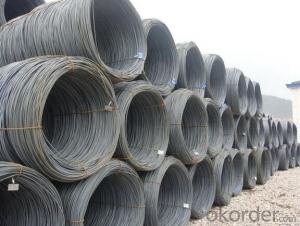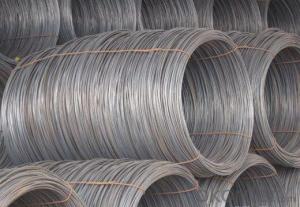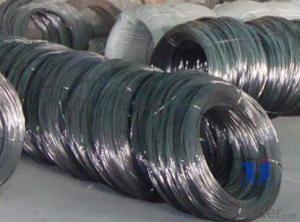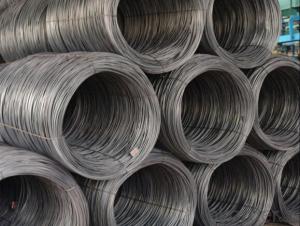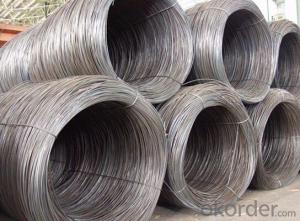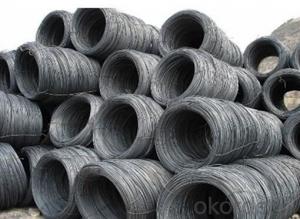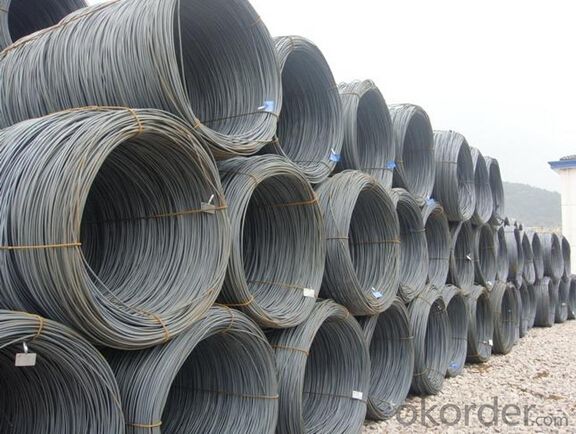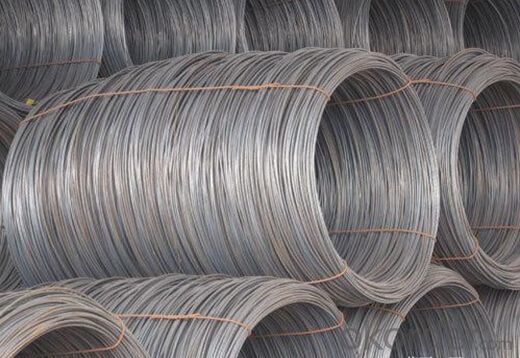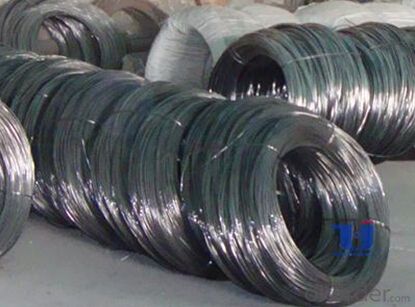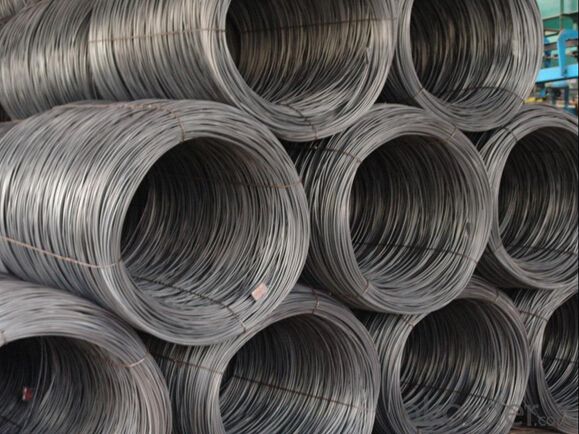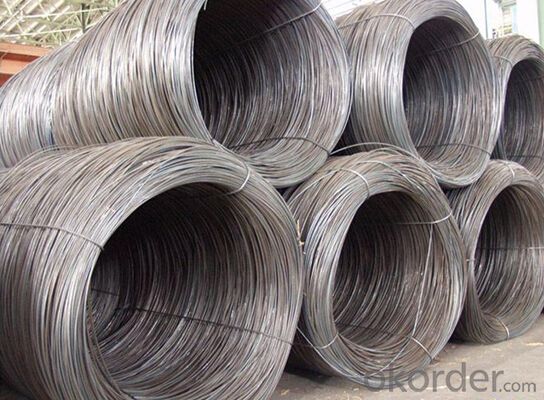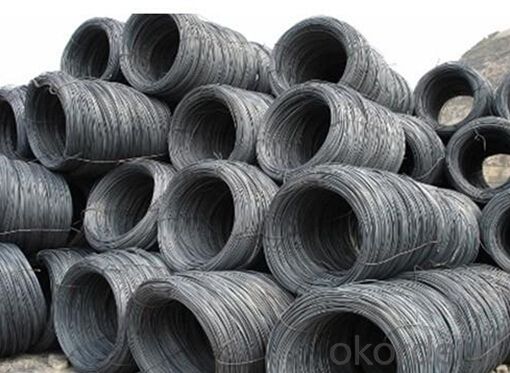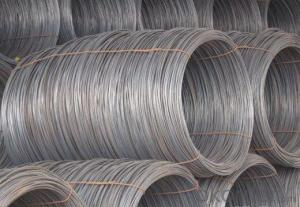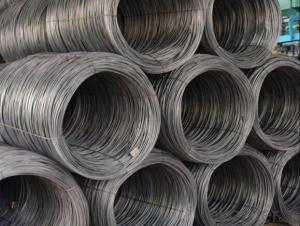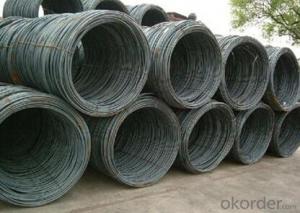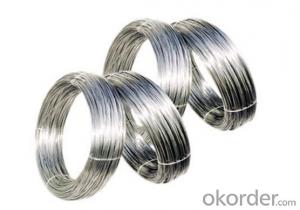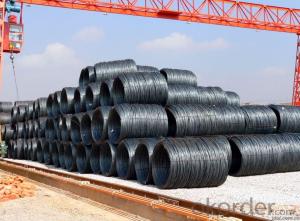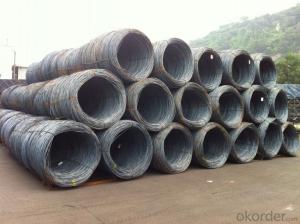Grade SAE 1018 Hot Rolled Steel Wire Rod in Coils
- Loading Port:
- Tianjin
- Payment Terms:
- TT OR LC
- Min Order Qty:
- 3 m.t.
- Supply Capability:
- 10000 m.t./month
OKorder Service Pledge
Quality Product, Order Online Tracking, Timely Delivery
OKorder Financial Service
Credit Rating, Credit Services, Credit Purchasing
You Might Also Like
Specification
Type:
Carbon Steel,Spring Steel,Bearing Steel,Gear Steel,Deformed Steel,Stainless Steel,Alloy Steel
Shape:
Steel Coil,Steel Sheet,Steel Wire Rod,Steel Flat Bar,Steel Square Bar,Steel Angle,Steel Round Bar,Steel Billets
Technique:
Hot Rolled,Cold Rolled,Cold Drawn,ERW,Forged,Saw,Extruded,EFW,Spring
Surface Treatment:
Galvanized,Coated,Copper Coated,Color Coated,Oiled,Dry,Chromed Passivation,Polished,Bright,Black,PVDF Coated
Certification:
ISO,SGS,BV,IBR,RoHS,CE,API,BSI,UL
Thickness:
5.5mm, 6.5mm, 8-14mm
Width:
5.5mm, 6.5mm, 8-14mm
Length:
In coils
Outer Diameter:
5.5mm, 6.5mm, 8-14mm
Net Weight:
2m.t.
Packaging:
seaworthy packaging
Grade SAE 1018 Hot Rolled Steel Wire Rod in Coils
Detailed Information of the Grade SAE 1018 Hot Rolled Steel Wire Rod in Coils
| Name | Hot Rolled High Carbon Wire Rod |
| Shape | Round Bar/Square Bar/Flat Bar/Plate/Wire |
| Standard | GB/ASTM/SAE/AISI/DIN/JIS/EN/BS |
| Surface Treatment: | Black/Peeling/Polished/Machined |
| Delivery Condition: | Hot Rolled or Forged/Peeled or Black Surface |
| Test | SGS/UT 100% Elements Testing |
| Certificate: | ISO/Mill Certificate |
| Service: | 24 hours online service / |
| more than 20 years trading and manufacture | |
| Quality Assurance: | the third party inspection, such as SGS, BV, TUV…etc. is acceptable |
| Packaging Details: | Seaworthy Packaging or as per customer's packing instruction |
Chemical Composition of the Grade SAE 1018 Hot Rolled Steel Wire Rod in Coils
| Grade | Chemical Composition(%) | |||||
| C | Mn | Si | S | P | B | |
| SAE1006B | 0.03~O.07 | ≤0.32 | ≤0.30 | ≤0.045 | ≤0.040 | >0.0008 |
| Mechanical properties | ||||||
| Yield strength(N/mm2) | Tensile strength(N/mm2) | Elongation(%) | ||||
| 250-280 | 350-380 | ≥32 | ||||
Company Introduction the Grade SAE 1018 Hot Rolled Steel Wire Rod in Coils
CNBM International Corporation is the most import and export platform of CNBM group(China National Building Material Group Corporation) ,which is a state-owned enterprise, ranked in 270th of Fortune Global 500 in 2015.
With its advantages, CNBM International are mainly concentrate on Cement, Glass, Iron and Steel, Ceramics industries and devotes herself for supplying high quality series of refractories as well as technical consultancies and logistics solution.
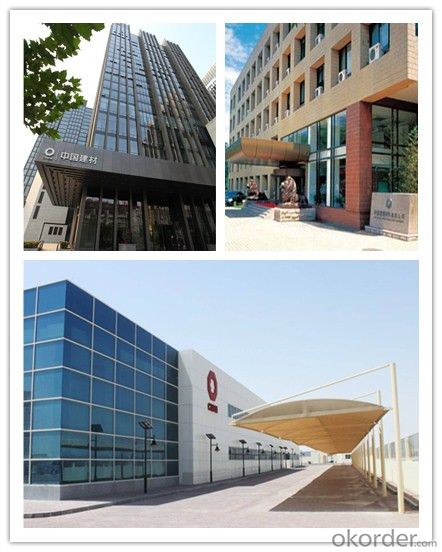
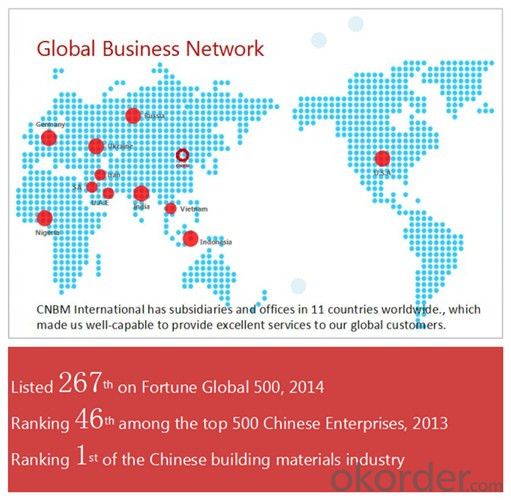
| After-sale service | CNBM provides the services and support you need for every step of our cooperation. We’re the business partners you can trust; you can relax and get on with doing business. |
| For any problem, please kindly contact us at any your convenient time, we’ll reply you in our first priority within 24 hours | |
| Advantages | Industry experience over 20 years. |
| Shipment of goods -More than 70 countries worldwide. | |
| The most convenient transport and prompt delivery. | |
| Competitive price with best service. | |
| High technical production line with top quality products. | |
| High reputation based on best quality products. |
Packaging & Delivery the Grade SAE 1018 Hot Rolled Steel Wire Rod in Coils
| Packaging Detail | Sea worthy packing /as per customer's packing instruction |
| Delivery Detail | 15 ~ 40 days after receiving the deposit |
Products Show
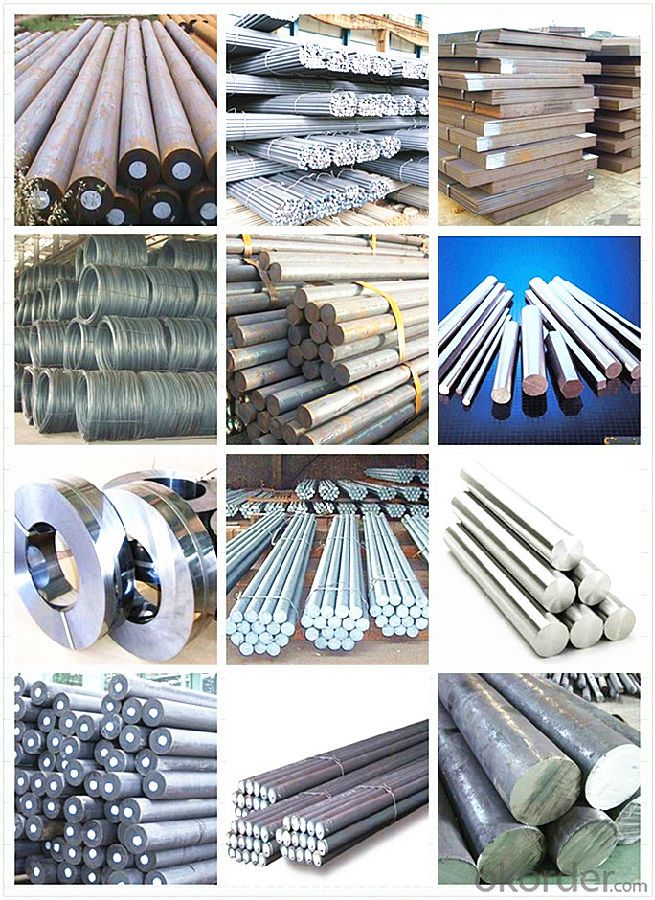
FAQ:
| Are you a trader or manufacturer? | Manufacturer |
| What’s the MOQ? | 3 metric ton |
| What’s your delivery time? | 15-35 days after downpayment received |
| Do you Accept OEM service? | Yes |
| what’s your delivery terms? | FOB/CFR/CIF |
| What's the Payment Terms? | 30% as deposit,70% before shipment by T/T |
| Western Union acceptable for small amount. | |
| L/C acceptable for large amount. | |
| Scrow ,Paybal,Alipay are also ok | |
| Why choose us? | Chose happens because of quality, then price, We can give you both. |
| Additionally, we can also offer professional products inquiry, products knowledge train (for agents), smooth goods delivery, excellent customer solution proposals. | |
| What's your available port of Shipment? | Main Port, China |
| What’s your featured services? | Our service formula: good quality+ good price+ good service=customer's trust |
| Where are your Market? | Covering more than 160 countries in the world |
- Q: What is the impact of titanium in special steel alloys?
- Titanium is a highly versatile and valuable element when it comes to special steel alloys. Its addition to steel alloys has a significant impact on their properties and performance. One of the major impacts of titanium in special steel alloys is improved strength and durability. Titanium has a high strength-to-weight ratio, which means that even a small amount of titanium can greatly enhance the strength of the steel alloy. This is particularly beneficial in applications where high strength and resistance to deformation or fatigue are required, such as in aerospace or automotive industries. Moreover, titanium also contributes to the corrosion resistance of steel alloys. It forms a protective oxide layer on the surface of the steel, preventing or reducing the effects of corrosion caused by exposure to various environmental factors such as moisture, chemicals, or saltwater. This corrosion resistance is especially crucial in industries where steel is exposed to harsh conditions, such as marine or offshore applications. Another significant impact of titanium in special steel alloys is its ability to improve heat resistance. Titanium has a high melting point and excellent thermal stability, making steel alloys with titanium suitable for high-temperature applications. This is particularly important in industries like power generation, where steel components must withstand extreme temperatures without losing their structural integrity. Furthermore, titanium imparts excellent weldability to steel alloys. It acts as a deoxidizer, reducing the presence of impurities and improving the quality of welds. This is highly advantageous in manufacturing processes where welding is involved, as it ensures strong and reliable joints. In summary, the impact of titanium in special steel alloys is multifaceted and highly beneficial. It enhances the strength, durability, and corrosion resistance of steel, while also improving its heat resistance and weldability. These properties make titanium an invaluable element in the development of high-performance steel alloys for a wide range of industries.
- Q: How is special steel used in the production of engine components?
- Special steel is used in the production of engine components due to its exceptional strength, durability, and resistance to heat and corrosion. It is commonly used to manufacture parts such as crankshafts, camshafts, connecting rods, and valves, which are subjected to high stress and temperature conditions. The special steel's properties enable these components to withstand the demanding operating conditions of engines, resulting in enhanced performance, reliability, and longevity.
- Q: What are the typical mechanical properties of special steel?
- The mechanical properties of special steel can vary depending on its specific grade and composition. However, there are certain general characteristics that can be anticipated. Special steels are often designed to have enhanced properties compared to standard carbon steels, which makes them suitable for specific applications that require superior strength, hardness, or resistance to wear and corrosion. One important mechanical property of special steel is its high tensile strength. These steels are typically engineered to have higher strength levels than standard steels. As a result, they can withstand heavy loads and stresses without deforming or failing, making them ideal for industries like construction, automotive, and aerospace where structural integrity is crucial. Special steels also demonstrate excellent hardness, which measures a material's ability to resist permanent indentation or scratching. This property is often achieved through the addition of alloying elements and heat treatment processes that enhance the steel's ability to resist wear and abrasion. Consequently, special steels are commonly used in tools, cutting equipment, and machinery components subjected to severe wear conditions. Furthermore, special steel alloys can possess exceptional toughness, which refers to the material's ability to absorb energy and resist fracture under impact or sudden loading. This is particularly important in applications where impact resistance is vital, such as the manufacturing of heavy-duty machinery or structures subjected to dynamic loads. Additionally, special steels may exhibit improved corrosion resistance compared to standard steels. This is achieved by incorporating alloying elements like chromium, nickel, or molybdenum, which create a protective oxide layer on the steel's surface, preventing or slowing down the process of corrosion. Industries dealing with corrosive environments, such as marine, oil and gas, and chemical processing, highly value this property. In summary, special steel possesses typical mechanical properties such as high tensile strength, excellent hardness, exceptional toughness, and improved corrosion resistance. These properties allow special steels to excel in various applications where superior performance is required, making them essential in numerous industries worldwide.
- Q: Can special steel be used for luxury goods?
- Yes, special steel can definitely be used for luxury goods. Special steel, known for its exceptional durability, strength, and unique properties, can be utilized in the production of high-end luxury goods such as watches, jewelry, knives, and even high-performance vehicles. Its superior quality and aesthetic appeal make it an ideal choice for manufacturers seeking to create luxurious and exclusive products.
- Q: What are the heat treatment processes used for special steel?
- Some of the heat treatment processes used for special steel include annealing, quenching, tempering, and hardening. Annealing involves heating the steel to a specific temperature and slowly cooling it to improve its ductility and reduce internal stress. Quenching is a rapid cooling process that hardens the steel by quickly cooling it from a high temperature, creating a tough and wear-resistant material. Tempering is a process that follows quenching, where the steel is reheated to a lower temperature to reduce brittleness and improve toughness. Hardening involves heating the steel to a high temperature and then rapidly cooling it to increase its hardness and strength. These heat treatment processes are used to enhance the properties and performance of special steel for various applications.
- Q: Can special steel be used in automotive engine components?
- Automotive engine components can indeed benefit from the utilization of special steel. Also referred to as alloy steel, special steel possesses enhanced properties, including increased strength, toughness, and heat resistance. These attributes make it highly suitable for the utilization in critical engine components that endure high temperatures, stress, and wear. Within the realm of automotive engines, special steel finds application in an array of components, such as crankshafts, camshafts, connecting rods, valves, and piston rings. These components encounter extreme conditions, including elevated temperatures, pressure, and rotational forces. Special steel confers the necessary strength and durability to withstand these conditions, consequently ensuring dependable engine performance and longevity. The incorporation of special steel within automotive engine components yields several advantages. Firstly, it heightens the strength and load-carrying capacity of the components, enabling them to handle greater power and torque outputs. Secondly, special steel bolsters the fatigue resistance and durability of the components, thereby diminishing the likelihood of failure and prolonging their service life. Lastly, special steel exhibits the ability to endure the high temperatures and thermal cycling experienced within the engine, thereby averting deformation and upholding dimensional stability. On the whole, the utilization of special steel in automotive engine components assumes paramount importance in the pursuit of attaining optimal performance, reliability, and longevity. It guarantees that the engine can endure the demanding conditions under which it operates, ultimately granting a smoother and more efficient driving experience.
- Q: What is the role of heat treatment in special steel?
- The role of heat treatment in special steel is to enhance its mechanical properties and improve its performance by altering its microstructure through controlled heating and cooling processes. This helps to achieve desired properties such as increased hardness, strength, toughness, and ductility, as well as improved wear resistance and corrosion resistance. Heat treatment also allows for the refinement of grain structure, elimination of internal stresses, and modification of the steel's crystalline structure, which ultimately improves the overall quality and usability of special steel in various applications.
- Q: How does special steel contribute to reducing product costs?
- Special steel contributes to reducing product costs in several ways. Firstly, special steel has a higher strength-to-weight ratio, meaning that less material is required to achieve the same strength and performance as traditional steel. This reduces the overall amount of steel needed for manufacturing, leading to cost savings. Additionally, special steel is known for its durability and resistance to wear, corrosion, and heat, thus reducing the need for frequent repairs or replacements. This prolongs the lifespan of products, resulting in reduced maintenance and replacement costs. Furthermore, special steel often allows for more precise and efficient manufacturing processes, such as forging or machining, which can lower production costs by minimizing waste and improving productivity. Overall, the use of special steel in product manufacturing helps to optimize material usage, enhance durability, and streamline production, consequently reducing product costs.
- Q: What are the applications of special steel in the renewable energy sector?
- The development and advancement of various renewable energy technologies heavily rely on special steel. Specifically, in the renewable energy sector, special steel is crucial for the manufacturing of wind turbines. Wind turbine components, including towers, generator frames, rotor hubs, and bearings, require high-strength and corrosion-resistant steel to withstand harsh operating conditions such as strong winds and exposure to moisture. The use of special steel ensures the longevity and reliability of wind turbines, thus promoting the growth of wind energy. Furthermore, special steel is extensively employed in the construction of solar power plants. Steel with excellent structural integrity, durability, and resistance to environmental degradation is necessary for solar panel frames, mounting structures, and support systems. Special steel provides these desired qualities, ensuring the stability and optimal performance of solar installations. In addition, special steel finds applications in the production of components for hydroelectric power plants. The construction of turbines, penstocks, and other hydraulic equipment requires steel with high tensile strength and resistance to corrosion caused by water and sediments. Special steel alloys possess these characteristics, making them ideal for hydroelectric power generation. Moreover, special steel is utilized in the manufacture of energy storage systems, such as batteries and fuel cells. These systems demand steel with outstanding conductivity, corrosion resistance, and mechanical strength to ensure efficient and reliable energy storage. Special steel alloys can meet these requirements, making them suitable for use in renewable energy storage technologies. In conclusion, special steel plays a vital role in the renewable energy sector by providing the necessary properties for the manufacturing of wind turbines, solar power plants, hydroelectric power plants, and energy storage systems. Its high-strength, corrosion-resistant, and durable characteristics enable the development of efficient and reliable renewable energy technologies, thereby contributing to the sustainable energy transition.
- Q: What are the specific requirements for special steel used in the electronics industry?
- In order to meet the unique demands of the electronics industry, special steel must fulfill certain requirements. These requirements include: 1. To protect electronic components from environmental factors like moisture, humidity, and chemical exposure, special steel used in the electronics industry must have high corrosion resistance. 2. Efficient transmission of electricity within electronic devices relies on the excellent electrical conductivity exhibited by the steel. This property is crucial for the proper functioning of electronic components. 3. Depending on the application, special steel used in the electronics industry must possess specific magnetic properties. Some electronics require non-magnetic steel to avoid interfering with sensitive magnetic components, while others may need specific magnetic properties for magnetic shielding or as core material in transformers. 4. To ensure the longevity and reliability of electronic components, the steel must possess high strength and durability, enabling it to withstand the stresses and strains encountered during the manufacturing process and throughout the lifespan of the electronic device. 5. Special steel used in the electronics industry must be able to withstand high temperatures without compromising its structural integrity or electrical properties. This is particularly important in electronic devices that generate heat, such as computer processors or industrial control systems. 6. The steel must be easily formable and machinable to enable efficient manufacturing processes and the production of intricate electronic components. This allows for the fabrication of complex shapes and designs required in the electronics industry. 7. To ensure optimal performance and reliability of electronic devices, special steel used in the electronics industry should have minimal impurities and contaminants. High purity steel guarantees the absence of unwanted elements that may cause electrical or chemical interference. Meeting these specific requirements for special steel used in the electronics industry is crucial for producing high-quality and reliable electronic devices. By fulfilling these requirements, the steel can withstand the challenges and environmental conditions unique to the electronics industry, ultimately contributing to the overall performance and functionality of electronic devices.
Send your message to us
Grade SAE 1018 Hot Rolled Steel Wire Rod in Coils
- Loading Port:
- Tianjin
- Payment Terms:
- TT OR LC
- Min Order Qty:
- 3 m.t.
- Supply Capability:
- 10000 m.t./month
OKorder Service Pledge
Quality Product, Order Online Tracking, Timely Delivery
OKorder Financial Service
Credit Rating, Credit Services, Credit Purchasing
Similar products
Hot products
Hot Searches
Related keywords
